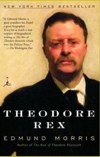Theodore Rex
In 1908, as he prepared to leave the White House after seven extremely popular years, Roosevelt convened a national conference on Conservation to address the deterioration of the environment. “We should not forget,” he said in the opening keynote, “that it will be just as important to our descendants to be prosperous in their time as it is to us to be prosperous in our time.” At lunch, he was delighted to talk with The Great Commoner, William Jennings Bryan, who personified the Other Party (and who would run and lose, once more, in the upcoming election). The two got along famously; Roosevelt still lived in a world where Republicans were reality-based and if the environment was not yet much of a Democratic cause, everyone could see the importance of preserving forests and waters and minerals would hold for the future.
At the start of the 20th century, Theodore Roosevelt created a new synthesis of American politics — an energetic, reform-minded, and conservative Republicanism. He was terrifically popular and surprisingly successful, and when he left the White House in 1908 it seemed that the Republicans would continue to be the party of Progress, leaving the Democrats the sad consolation of the solid South, the religious crazies, and a few anti-government tycoon extremists. Roosevelt's future took a century to unfold, and required the other party will pick up the banner his successors cast aside in the early twentieth century and tried to trample underfoot in the first years of the 21st.

